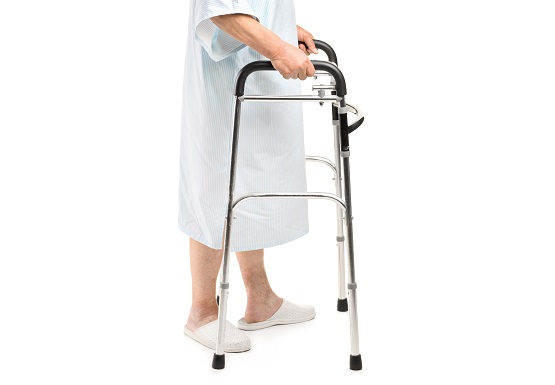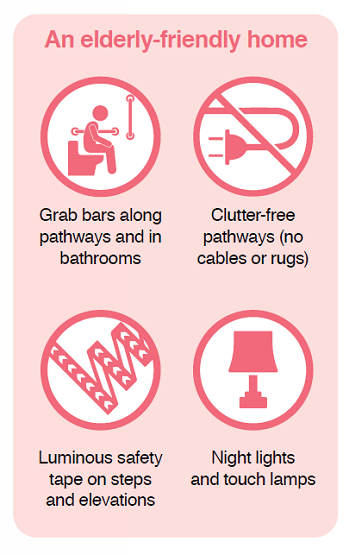
Falls are one of the most common causes of injury among the elderly. Ng Lih Wing, Senior Physiotherapist at the Rehabilitation Centre, shares some practical advice on how they can be avoided.
HOMING IN ON THE FACTS
Globally, one in three adults aged above 65 falls once a year. According to the National Registry of Diseases Office (NRDO) of Singapore, the rate of accidental falls in 2012 was 277.7 per 100,000 for adults aged 60 years and older. This increases sharply with age. Overall, females are likelier to fall than males, and singles are likelier to fall than married people. The majority of falls occur in the home.
Falls often have serious consequences. The most frequent types of injuries are head and face traumas (29.6 percent), lower limb (24.2 percent) and upper limb injuries (13.6 percent) including bone fractures, followed by trunk injuries (9.3 percent) and others, including burns and lacerations.
FALLS RISK FACTORS
There are many risk factors that can contribute to falls. They can be loosely divided into personal risk factors and environmental ones.
Falls often have serious consequences. The most frequent types of injuries are head and face traumas (29.6 percent), lower limb (24.2 percent) and upper limb injuries (13.6 percent) including bone fractures, followed by trunk injuries (9.3 percent) and others, including burns and lacerations.
Personal risk factors include:
• medication-induced dizziness
• functional disabilities
• sensory impairment, especially poor vision and poor hearing
• chronic medical conditions
• depression
Environmental risk factors include:
• slippery floors
• inappropriate footwear
• poor lighting
• excessive glare
• pathway obstructions
HOW TO MINIMISE THE RISK OF FALLS AT HOME
Though the mention of home evokes images of a safe place, it is fraught with fall hazards, especially for the elderly. Many falls occur to and from the toilet, since elderly people often face frequent urination issues.
While Lih Wing emphasises that there is no such thing as ‘fall-proofing’ a home, she suggests that structural modifications such as grab bars, night lights and luminous safety tape on steps can make homes more elderly- friendly, especially when combined with good housekeeping.
“Keeping pathways clear of clutter, cables and rugs is equally important. Reorganising and reducing clutter along with installing rails has shown to be most effective in preventing falls,” said Lih Wing.

EYEWEAR AND ATTIRE
At a personal level, wearing well-fitting glasses with up-to-date prescription lenses and sensible shoes can significantly reduce the risk of falls.
“Loose comfortable rubber shoes, slippers and sandals without heel straps are popular among Singaporeans. This kind of shoe is not only convenient to slip on and off, but also suited to our hot and humid weather. However, it can be a killer,” cautioned Lih Wing.
Instead of slippers, Lih Wing urges elderly people to wear comfortable, well-fitting shoes with heel straps, cushioned heels and non-slip soles that are able to be flexed about 30 degrees, not 180 degrees.
REGULAR EXERCISE
In addition to going for regular medical check-ups, Lih Wing recommends regular exercise to strengthen ageing muscles, improve stability and reduce the risk of falls. For elderly people who are mobile, Lih Wing recommends simple walking as a good form of exercise.
“Do not just walk forward, try to walk sideways as well. Increase the speed as your ability improves. Go up and down a step sideways if you can, making sure to lightly hold onto the railing if your balance is not great,” suggested Lih Wing.
For elderly people who find walking difficult, yet are still able to stand, simply repeatedly rising from a chair is a great way to train and strengthen legs.
“Make sure you stand up straight and sit down in a controlled manner. Repeat till your legs feel slightly tired. Count the number you can do and you will slowly find yourself getting stronger and doing more!” encouraged Lih Wing.
TAKE STEPS TO STAY ON YOUR FEET
If you are elderly, or approaching your senior years, take active steps to stay on your feet. Look after your health, swap your slippers for sensible footwear, keep moving, and ready your home in anticipation of a long and active life.
Mount Alvernia Hospital Rehabilitation Centre
Tel: +65 6347 6203 / +65 6347 6365
Mon to Fri: 8.30am to 5pm
Sat: 8.30am to 1pm
Sun & PH: Closed
This article is taken from our My Alvernia Magazine Issue #42/43. Click here to read the issue on our website or on Magzter.